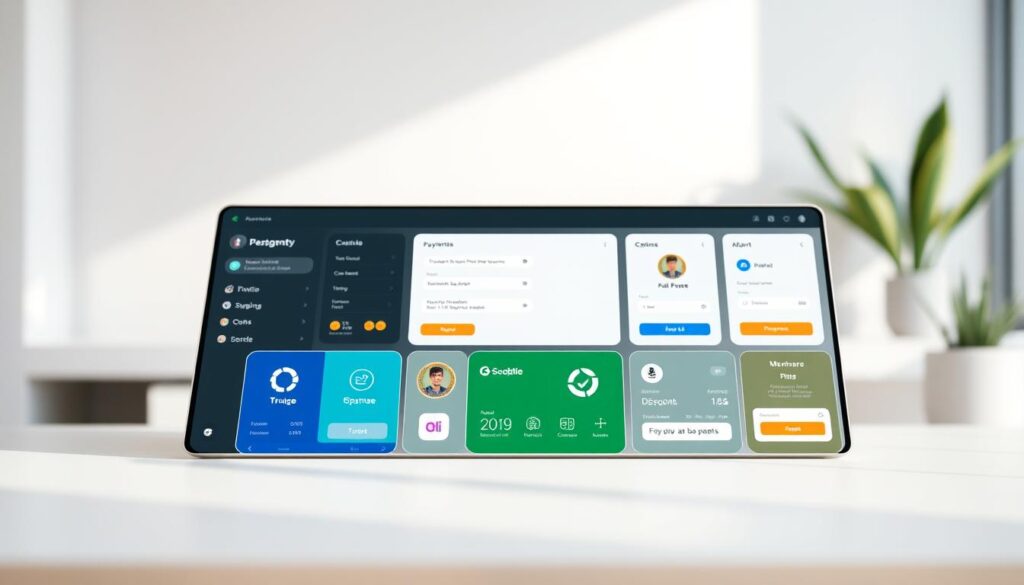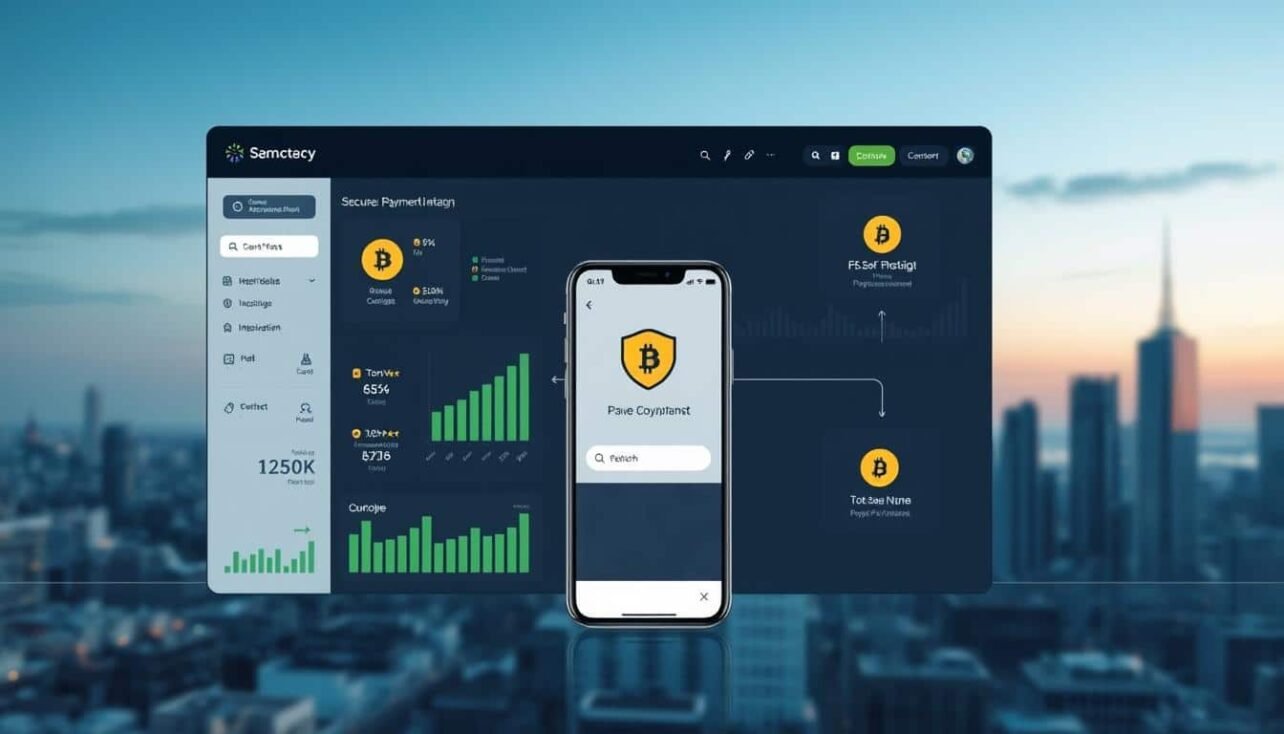Businesses today face exciting opportunities to expand their reach and modernize their financial operations. Adopting digital currency solutions opens doors to a global market of over 200 million users who prefer alternative transaction methods.
This comprehensive guide explores how companies can successfully implement crypto payment systems into their existing operations. The process involves selecting the right provider, configuring secure workflows, and establishing protocols that protect both businesses and customers.
Whether you operate an e-commerce platform or service-based business, digital currency acceptance offers practical advantages. These include reduced processing fees, faster settlement times, and access to privacy-conscious consumers who value modern financial options.
Key Takeaways
- Global market access to over 200 million digital currency users worldwide
- Significant reduction in transaction costs compared to traditional methods
- Irreversible transactions that eliminate fraud chargebacks
- Instant payment capabilities across 229 countries and territories
- Enhanced security measures with defense-grade protection
- Multi-currency support and customizable payment interfaces
- Faster settlement times and improved cash flow management
Introduction to Cryptocurrency Payment Solutions
At the heart of accepting digital assets are two distinct technologies: payment gateways and wallets. These solutions have evolved into advanced platforms. They handle complex processes automatically.
A crypto payment service acts as an intermediary for businesses. It processes transactions and converts digital value into traditional currency. This manages the entire flow from checkout to settlement.
This differs from a digital wallet, which is a personal tool. Individuals use it to store, send, and receive digital assets. It holds the cryptographic keys for blockchain access.
| Feature | Payment Gateway (e.g., CoinGate) | Digital Wallet |
|---|---|---|
| Primary User | Businesses & Merchants | Individuals |
| Main Function | Accept and process transactions | Store and manage digital assets |
| Key Advantage | Automatic conversion & settlement | Personal control & security |
| Supported Assets | Bitcoin, Ethereum, Litecoin, stablecoins | Varies by wallet type and provider |
Modern gateways support various digital assets like Bitcoin and Ethereum. This gives companies flexibility based on customer preference.
The service handles technical details like blockchain confirmations. It also manages real-time exchange rates. This allows businesses to focus on core operations.
These platforms address critical needs. They offer instant conversion to eliminate volatility risk. They also ensure compliance with financial regulations.
Cryptocurrency Payment Gateway Merchant Integration
Companies looking to adopt blockchain-based transactions must navigate various implementation pathways based on their operational needs. The technical setup ranges from simple plugin installations to complex custom API development.
Organizations should evaluate their transaction volume expectations and supported digital assets before choosing an integration method. Settlement preferences and system compatibility also influence the decision-making process.
Successful implementation requires coordinating multiple components like checkout interfaces and backend systems. This ensures seamless transaction recording and proper accounting reconciliation.
Modern providers offer solutions for different technical capabilities. Options include no-code hosted pages and developer-friendly APIs with comprehensive documentation.
Thorough testing before launch confirms that payment flows work correctly across devices. This verification process protects both the company and its customers.
The timeline for going live can range from minutes to several weeks. This depends on technical resources and specific operational requirements.
Benefits of Accepting Crypto Payments in Your Business
Forward-thinking organizations discover multiple operational benefits when they embrace digital asset acceptance. These advantages extend beyond simple transaction processing to transform how companies operate globally.
One significant advantage is the elimination of fraud chargebacks. Unlike reversible credit card transactions, crypto payments become permanent once blockchain confirmation occurs. This protection saves companies from costly disputes that plague traditional systems.
Financial efficiency improves dramatically with lower transaction fees. Some providers charge as little as 0.23% compared to standard credit card rates of 2-3%. These savings directly boost profit margins for every sale.
Global expansion becomes instantly accessible without complex international banking. Your company can reach customers across 229 countries without currency conversion hassles. This removes barriers that typically slow international growth.
The crypto user base represents hundreds of millions of tech-savvy consumers worldwide. These customers actively seek businesses accepting digital currencies and often have substantial purchasing power.
Settlement times accelerate from days to minutes with blockchain confirmations. This improved cash flow management helps businesses operate more efficiently than with traditional banking delays.
Privacy-conscious customers appreciate transactions that don’t require sharing sensitive financial data. This builds trust and expands your market to include those preferring pseudonymous options.
Companies accepting crypto position themselves as innovative leaders. This forward-thinking image appeals to younger demographics and creates positive brand associations that differentiate from competitors.
Secure Transactions and Fraud Prevention
Security remains a top priority when handling digital asset transactions, with advanced protocols ensuring fund safety. Modern systems incorporate defense-grade measures that exceed traditional banking standards.

Leading providers implement multi-layered protection systems. These include encryption, cold storage, and multi-signature authentication.
| Security Feature | Traditional Payments | Crypto Transactions |
|---|---|---|
| Fraud Protection | Limited chargeback protection | Eliminates chargeback fraud |
| Authentication | Basic password systems | Multi-factor verification |
| Infrastructure | Centralized servers | Distributed blockchain network |
| Data Security | Sensitive information stored | Minimal personal data required |
The blockchain’s immutable nature creates permanent transaction records. This prevents manipulation and ensures verification integrity.
Crypto payment systems eliminate chargeback risks entirely. Once confirmations complete, transactions become irreversible.
Businesses benefit from near-zero lost funds and minimal downtime. Regular security audits maintain robust protection standards.
Integrating Easy-to-Use APIs and Plugins
Developers seeking to implement digital currency options have powerful tools at their disposal. Modern platforms provide comprehensive resources that streamline the technical implementation process.
These systems offer robust libraries supporting popular programming languages. Teams can work with PHP, Python, Node.js, Ruby, and Java frameworks.
Understanding API Documentation and Libraries
Interactive documentation serves as your technical guide through the entire process. It includes practical code examples and detailed parameter explanations.
Comprehensive error handling helps teams troubleshoot issues quickly. Clear status codes and resolution guidance prevent implementation delays.
RESTful architecture ensures compatibility with modern web frameworks. Developers recognize standard HTTP methods and JSON responses from other services.
Step-by-Step Integration Process
The implementation journey begins with account creation and credential generation. Next comes library installation and digital asset configuration.
Sandbox environments allow complete testing without real transactions. This ensures everything works correctly before going live.
Pre-built plugins offer alternatives for teams with limited coding resources. Simple installations bring functionality to your website quickly.
Version control protects against breaking changes during updates. Providers maintain backward compatibility while introducing new features.
Leveraging Customizable Widgets for Payment Experience
Modern e-commerce platforms benefit from embeddable tools that simplify the checkout process. These widgets create seamless payment experiences that integrate visually with existing website designs.

Businesses can implement these solutions in minutes without extensive technical knowledge. The widgets provide fast, secure interfaces that customers complete quickly.
Pricing Widget and Payment Button Features
Pricing widgets are ideal for SaaS platforms and subscription services. They showcase multiple plans with customizable tables and single-click convenience.
These tools offer flexible layouts for different business categories. Companies can add or remove widget cards based on their plan offerings.
Payment buttons provide simplified solutions for fixed-amount transactions. They work well for charities, content creators, and quick online payments.
Customization options include color schemes, icons, and branding elements. Businesses can set prices in preferred fiat currencies for consistency.
The button widget API integration allows for advanced customization. This maintains brand consistency throughout the customer payment experience.
| Feature | Pricing Widget | Payment Button |
|---|---|---|
| Primary Use | Multiple plan options | Fixed amount transactions |
| Ideal For | SaaS, subscriptions | Donations, quick payments |
| Customization | Layouts, plan cards | Colors, icons, branding |
| Implementation | Embed codes | Simple button placement |
Both widget types handle responsive design automatically. They ensure optimal experiences across desktop and mobile devices.
Open-Source Plugins and Platform Compatibility
Website owners can rapidly implement digital currency acceptance using readily available open-source extensions. These tools eliminate complex coding requirements while maintaining full functionality.
Pre-built solutions work seamlessly with existing e-commerce systems. They handle transaction processing automatically without disrupting current operations.
WordPress, Magento, and Other Popular Platforms
Leading content management systems offer dedicated plugins for digital asset acceptance. WordPress and Magento represent the most widely adopted platforms with robust extension ecosystems.
Installation typically involves downloading the plugin package and uploading through admin interfaces. Configuration requires entering API credentials and selecting preferred digital assets.
| Platform | Primary Use | Plugin Availability | Setup Complexity |
|---|---|---|---|
| WordPress | Blogs & Small Business | Extensive Plugin Library | Low (One-Click Install) |
| Magento | Enterprise E-commerce | Dedicated Extensions | Medium (Admin Panel) |
| Shopify | Online Stores | App Store Integration | Low (App Installation) |
Platform compatibility extends to Shopify, PrestaShop, and OpenCart systems. This ensures businesses can implement solutions regardless of current technology choices.
Open-source availability allows code inspection for security verification. Developers can customize functionality to match specific operational requirements.
Community support forums provide troubleshooting assistance from experienced users. Regular plugin updates maintain compatibility with platform enhancements.
Managing Transaction Fees and Cost-Effectiveness
Cost management represents a fundamental aspect of adopting blockchain-based financial solutions. Transaction fees directly impact profitability for merchants evaluating digital currency systems.

Leading providers charge remarkably low processing fees—some as minimal as 0.23%. This creates dramatic savings compared to traditional methods that typically cost 2-3% per transaction.
Advanced features like gas station functionality further reduce expenses. These systems minimize blockchain network costs on selected digital assets.
Merchants benefit from transparent fee structures without hidden charges. This economic approach works for businesses of all sizes, from startups to enterprise operations.
High-volume processors gain the most significant advantages. Tiered pricing models reward growing transaction volumes with progressively lower fees.
The elimination of chargeback costs and international surcharges enhances overall cost-effectiveness. These savings accumulate beyond basic processing fees.
Careful fee analysis ensures optimal financial outcomes. Businesses should consider both provider charges and network expenses when calculating total costs.
Real-Time Payment Notifications and Webhook Integration
The speed of digital commerce demands equally fast confirmation systems for completed transactions. Webhook technology provides instant data relay between your payment processor and business systems.
This creates seamless workflows that keep operations moving without manual checks. Your team gains immediate visibility into transaction status.
Instant Payment Data Relay
Webhooks eliminate the need for constant API polling by pushing data directly to your endpoints. When a transaction confirms on the blockchain, your systems receive notification instantly.
This automatic relay includes comprehensive details like amount, digital asset type, and confirmation status. The information flows directly into your order management and accounting systems.
Key advantages of real-time data include:
- Immediate order processing without delay
- Automatic inventory updates upon payment confirmation
- Seamless integration with existing business software
- Reliable retry mechanisms for uninterrupted data flow
Enhancing Customer Communication
Instant notifications transform the buyer experience by providing immediate confirmation. Customers receive order acknowledgments the moment their transaction completes.
This rapid communication reduces anxiety and builds trust in your business processes. Support teams can answer status inquiries with current information.
The system enables automated follow-ups like shipping notifications or digital delivery. This creates a professional experience that matches traditional payment methods.
Multi-Currency Support and Global Reach
Modern commerce thrives on accessibility, and digital asset acceptance breaks down traditional geographic barriers. Companies can now serve customers across 130+ countries without complex banking setups.

Leading platforms support 10+ major cryptocurrencies including Bitcoin, Litecoin, and Ethereum. This diversity accommodates over 200 million investors worldwide.
Supported Cryptocurrencies and Wallets
Universal wallet compatibility ensures customers can complete transactions using any digital wallet. Businesses benefit from support for 100+ wallet types and growing.
Stablecoin options like USDT provide price stability while maintaining blockchain advantages. Automatic conversion features let customers pay in their preferred digital asset.
| Feature | Traditional Systems | Modern Crypto Solutions |
|---|---|---|
| Supported Currencies | Limited fiat options | 100+ cryptocurrencies |
| Global Reach | Restricted by banking partners | 130+ countries instantly |
| Wallet Compatibility | Specific payment methods only | Any digital wallet accepted |
| Currency Conversion | Manual processes required | Automatic real-time conversion |
This flexible approach gives businesses instant access to international markets. Customers appreciate paying with their preferred digital assets.
The system continuously adds support for emerging cryptocurrencies. This keeps companies competitive as new digital assets gain popularity.
Customizable Payment Pages and Invoice Services
For businesses seeking to maintain control over their payment collection process, hosted payment pages offer the perfect solution. These tools create professional interfaces without requiring complex e-commerce infrastructure.
Creating a Branded Experience
Branded payment pages provide sharable URLs that work for freelancers, fundraisers, and companies of all sizes. They include goal trackers for amount-based and quantity-based targets.
Price field flexibility supports both fixed amounts and custom entry with quantity selectors. This accommodates various use cases from set-price products to donation campaigns.
Custom URL options allow redirection to branded domains or specific thank-you pages. This maintains consistency throughout the customer experience.
| Feature | Payment Pages | Invoice Services |
|---|---|---|
| Primary Use | Direct payment collection | Payment requests |
| Brand Customization | Full branding control | Logo and color schemes |
| Target Tracking | Amount & quantity goals | Payment status monitoring |
| Implementation | Hosted pages | Email delivery |
Invoice services generate dynamic invoices for requesting digital payments. They function seamlessly with hosted pages or API integrations.
Digital invoices can be sent instantly via email with payment buttons or QR codes. This streamlines the process compared to manual address copying.
Branded templates reinforce professional image while providing technical details. Companies can track which invoices remain unpaid or have settled.
These solutions help any online store manage transactions efficiently. They improve accounts receivable management for digital payments.
Dedicated Support and Defense Grade Security
The reliability of any financial platform hinges on its commitment to security and responsive assistance. These twin pillars ensure smooth operations and build user confidence in the system.
Advanced protective measures distinguish professional transaction systems from basic alternatives. Military-grade encryption and multi-signature architecture safeguard digital assets effectively.
| Security Aspect | Defense Grade Protection | Support Services |
|---|---|---|
| Primary Focus | Fund and data protection | User assistance and troubleshooting |
| Key Features | Cold storage, continuous monitoring | 24/7 availability, expert guidance |
| Implementation | Automated systems and protocols | Human team with technical expertise |
| Benefit to Users | Peace of mind and risk reduction | Quick resolution of operational issues |
Comprehensive security services include regular audits and penetration testing. These measures validate that protective claims match actual implementation quality.
Dedicated support ensures users receive timely assistance when needed. The expert team understands both blockchain technology and business operations.
Service tiers accommodate different user needs effectively. Basic plans offer limited support hours while premium options provide round-the-clock assistance.
Incident response protocols and insurance coverage add extra protection layers. Documentation resources complement direct support for common questions.
Customer Testimonials and Success Stories
The experiences of actual merchants reveal the measurable impact of implementing blockchain-based transaction systems. Real feedback from business owners provides valuable insights into operational improvements.
Merchant Experiences
Ethan Reynolds, M.D., shares: “With low processing fees, I’ve seen significant profit increases. This solution caused a substantial rise in customer numbers.”
Olivia Bennett, C.T.O., notes: “The staff provided excellent support during integration. Ease of use and customer response improved our efficiency.”
Mason Turner, C.E.O., emphasizes: “Privacy respect was key. I wasn’t asked for ID proof when seeking a platform without KYC requirements.”
| Business Type | Key Improvement | Result Timeline |
|---|---|---|
| Healthcare Practice | 25% profit increase | 3 months |
| Online Retail | 40% customer growth | 6 months |
| Tech Services | 30% efficiency gain | 4 months |
Proven Impact on Business Growth
High-profile endorsements like Mark Cuban’s statement demonstrate adoption by major organizations. Success stories span diverse industries including healthcare, e-commerce, and entertainment.
Consistent themes include profit margin improvements and operational efficiency gains. These documented results help prospective adopters overcome hesitation.
Industry Use Cases and Business Applications
The versatility of digital asset acceptance extends far beyond traditional e-commerce, reaching industries like real estate and entertainment. Companies across eight major sectors now leverage blockchain technology for financial operations.
From travel to healthcare, organizations discover practical benefits. These digital transactions eliminate traditional banking barriers.
Applications in E-Commerce, SaaS, and Token Sales
Online retailers represent the largest adoption group. They accept crypto to reach global customers and reduce processing costs significantly.
SaaS platforms benefit from subscription models using digital assets. This approach eliminates currency conversion issues and expired card problems.
Token sales utilize specialized widgets for fundraising campaigns. These tools handle multiple distribution rounds with different pricing strategies.
| Industry | Primary Benefit | Transaction Volume | Special Features |
|---|---|---|---|
| E-commerce | Global customer access | High volume | Chargeback protection |
| SaaS Platforms | Subscription management | Recurring | Auto-renewal support |
| Token Sales | Fundraising efficiency | Campaign-based | Presale widgets |
| Real Estate | Cross-border deals | Large amounts | International buyers |
Real estate businesses handle property purchases using major cryptocurrencies. This simplifies international transactions without banking delays.
The entertainment industry leverages micro-payments for digital content. Medical services maintain patient privacy through secure digital conversion methods.
Every business sector finds unique advantages in adopting various cryptocurrencies. The crypto ecosystem continues expanding across industries.
Developer Tools and Detailed Documentation
Technical implementation becomes straightforward with comprehensive developer tools designed for efficiency. These resources empower businesses to accept digital assets online while delivering optimal customer experiences.
Interactive API documentation provides immediate access to code examples and testing environments. Developers can accelerate integration timelines with pre-built functions that handle authentication automatically.
Interactive Docs and API Resources
Client libraries support popular programming languages, reducing implementation time significantly. The solution includes sandbox accounts for complete payment flow validation before live deployment.
Well-organized reference materials enable developers to implement crypto acceptance without extensive support requests. Code examples demonstrate common use cases like transaction verification and refund processing.
Developer communities and forums ensure quick resolution of implementation challenges. The tools enable card-less transactions where users complete payments using compatible wallets.
Regular API updates with generous transition periods protect development investments. This approach prevents breaking changes from disrupting your website operations.
Teams gain access to experienced engineers for complex integration scenarios. The system supports all types of users while eliminating traditional payment card requirements.
This comprehensive approach creates a seamless experience for both developers and end-users. The card-free system maintains security standards while simplifying the payment process.
Conclusion
Adopting digital currency systems represents a strategic move forward for modern enterprises. This approach delivers substantial advantages including reduced processing fees and elimination of chargeback risks.
The implementation process has become remarkably accessible through user-friendly tools and comprehensive support. Businesses can quickly set up systems that serve customers across numerous countries.
Robust security measures protect all parties throughout each transaction. Companies maintain brand consistency while offering flexible payment options.
Real-world success stories validate this technology as a practical business solution. The growing adoption of digital assets makes this an ideal time to explore these innovative financial tools.
FAQ
What is a crypto payment gateway?
A crypto payment gateway is a service that allows businesses to accept digital currencies like Bitcoin or Ethereum from their customers. It acts as the intermediary, securely processing the transaction and often converting the funds into traditional fiat currency for deposit into your bank account.
Why should my business accept crypto payments?
Accepting crypto payments can lower transaction fees, eliminate chargebacks, and attract a global customer base. It provides a modern payment option that can enhance your brand and open up new markets, especially in countries with limited access to traditional banking services.
How difficult is it to integrate a crypto payment solution?
Integration is typically straightforward. Most providers offer easy-to-use APIs, plugins for popular platforms like WordPress and Magento, and detailed documentation. Your development team can usually implement the solution quickly, often with access to supportive tools and resources.
Are cryptocurrency transactions secure?
Yes, transactions using a reputable gateway are highly secure. The underlying blockchain technology provides inherent security, and professional services add defense-grade measures like advanced encryption and real-time monitoring to protect against fraud and safeguard your funds.
How do I receive the funds from crypto sales?
You receive the funds in your chosen currency. The gateway automatically converts the cryptocurrency from the customer into fiat money, such as US dollars or euros, and deposits the net amount into your linked business bank account according to a set schedule, simplifying your accounting.
What kind of customer support can I expect?
Leading services provide dedicated support teams to assist with integration, troubleshooting, and daily operations. You can expect responsive help to ensure a smooth experience for both your business and your users, minimizing any disruption to your sales process.
Can I customize the payment experience for my customers?
A> Absolutely. Many solutions offer customizable payment buttons, pricing widgets, and invoice services. This allows you to create a branded checkout experience that matches your website’s look and feel, providing a seamless journey for your customers.


No comments yet